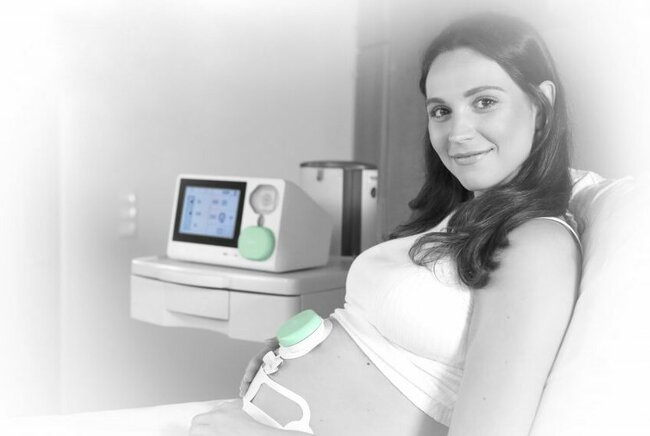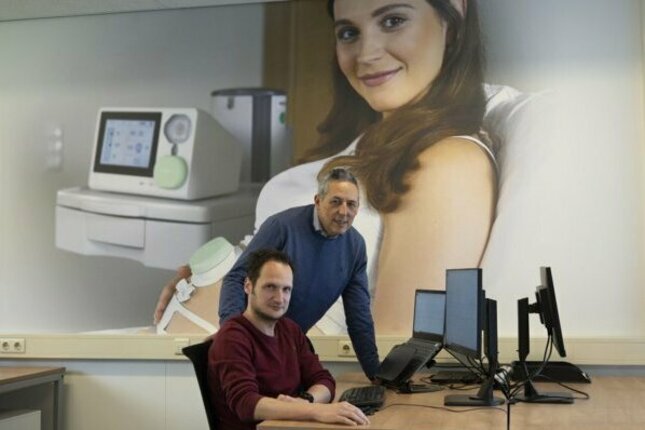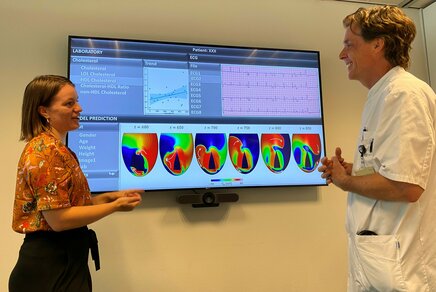In Denmark, Nemo Healthcare proves that home monitoring is safe and efficient
For the next four years, Nemo will be the exclusive supplier in Denmark.

In 2021, all Danish hospitals chose the fetal monitoring system from Nemo Healthcare, a spin-off of the Maxima Medical Center Maxima Medical Center and Eindhoven University of Technology. More than fifty NemoRemote systems are now in operation across Denmark. By means of an innovative patch and a tablet, both the unborn child and the mother can be monitored at home throughout the pregnancy. This allows an unborn child and the mother to be monitored at home during pregnancy via an innovative patch and tablet. CEO Michiel Manuel and business developer Will Ickenroth talk about how things are going one year after this big deal.
"They are adopting our technology on a massive scale in Denmark. For the next four years, we will be the exclusive supplier of this technology in the country. I think it's safe to say we're on the right track," Manuel smiles.
START-UPS AND SPIN-OFFS
TU Eindhoven (TU/e) is a breeding ground for new ideas that rely on scientific research. Sometimes these ideas develop into spin-offs and start-ups. This brings scientific research a step closer to society. In collaboration with The Gate and Innovation Origins, TU/e puts the spotlight every month on an innovative company that has emerged from scientific research. In episode 8: Nemo Healthcare.
Focus on home monitoring
The Netherlands is definitely looking into home monitoring as well, but we are not as far along as they are in Denmark, where they've already been working on it extensively for about ten years. As the focus over there is so strongly on home monitoring, a considerable amount of scientific research is also being carried out at the same time. Ickenroth: "We know, for instance, that the risk of developing complications does not increase with home monitoring. And that pregnant women find it comforting to be in control themselves."
NemoRemote
NemoRemote is a cardiotocograph (CTG): an instrument for recording the heartbeat of a foetus and the contractions of a pregnant woman during her pregnancy. The device interfaces with a patch on the pregnant woman's stomach. That patch monitors three types of measurements based on electrophysiological signals: the heart rate of the foetus and of the mother, and the contraction activity. "It is primarily about the correlation between these measurements. For example, the correlation between a contraction and a child's heart rate says something about how well the child is doing," Ickenroth goes on to explain.
The NemoRemote enables the mother to take CTG measurements of her own heart and the heart of her unborn child at home. The measurements are sent via a tablet to a gynecologist or obstetrician at the hospital.
Quicker prognoses thanks to data
“Our nervous system delivers electrical stimuli to muscles that make them move. The heart, with a relatively large amount of muscle tissue, has a very recognizable electrical pattern. This makes it possible in principle to make this signal perceptible,” co-founder Rik Vullings previously said in an interview. “It’s normally hidden between all kinds of other signals and noise.”
All the patient has to do is to take the measurement. The only thing she sees is whether the measurement was successful. She never gets to see diagnostic information, Manuel insists. The ensuing measurement results from the hospital are shared with the pregnant woman.
In the near future, drawing on all the data collected over time about the unborn child and mother, Nemo Healthcare plans to develop new applications that will provide even more insight into the health of the mother and unborn child. "We now have a wealth of information and are able to recognize the signals of an unhealthy situation more and more quickly. That may mean that in years to come, you could make a prognosis even before things are in danger of going wrong," Manuel notes.

We now have a wealth of information and are able to recognize the signals of an unhealthy situation more and more quickly. That may mean that in years to come, you could make a prognosis even before things are in danger of going wrong."
From Philips to a scale-up
Both men went from one of the largest companies in the Netherlands to a start-up that is since become a scale-up. Manuel: "Everyone here has to take care of everything. We roll up our sleeves and package systems too. The biggest difference is that at Philips, it didn't matter so much if something went sideways. Whereas here, I tend to check more often to see if we still have enough money in the bank."
"The emotional peaks and valleys are much steeper," Ickenroth adds. "If something doesn't go well here, I often lie awake at night worrying about it. But when something does go right, the sense of satisfaction is also much greater."
That fretting might be about finding good staff, for one, or the ever-rising delivery times. "Forty weeks or even a year is a very common delivery time these days. So, you have to think and plan far ahead. But for a small company, that has a huge impact on working capital." The design of the system is made up of as many standard components as possible whose stocks are more stable than those of highly specialized materials.
The emotional peaks and valleys are much steeper," Ickenroth adds. "If something doesn't go well here, I often lie awake at night worrying about it. But when something does go right, the sense of satisfaction is also much greater."
A healthcare system that is in overdrive
Another challenge that the tech company is encountering firsthand is the enormous pressure on the healthcare system. If a hospital decides to work with the system from Nemo Healthcare, that entails training that staff have to attend. Ickenroth: "We can see that the pressure on people in healthcare is steadily increasing. It sometimes happens that staff take vacation days just to be trained by us. That's really extreme. I don't think you can ask that of people. At the same time, of course, it also says something about the commitment and passion of people in healthcare. "
A frustrating situation, because the technology provided by Nemo can help to alleviate that pressure. The use of existing equipment frequently needs a lot of time and attention as well. For instance, at present, a midwife often has to remain with the patient during a measurement, while that can be kept to a minimum by using the innovative patches. "It then becomes much more of a matter of choice whether the midwife stays with the patient or not. Care can be more efficient and comfortable with our technology, except that in many hospitals, the current workload is so demanding that they are in no position to introduce it. By the way, this issue is not just playing out in the Netherlands, but all over Europe," Manuel points out.
Research conducted by the Gupta research firm on behalf of FME (the entrepreneurs' organization for the technology industry) reveals that the Netherlands will have a shortage of 135,000 healthcare workers in ten years' time, particularly in hospital and elderly care. According to the report, existing healthcare technology alone could free up as many as 110,000 healthcare workers. But, that would mean that available technology must be able to be implemented in the right way. "The turnover in healthcare is worrisome. Technology and companies like us can help change that," Ickenroth contends.
MMC and TU/e spin-off
Nemo Healthcare was founded as a spin-off from the Maxima Medical Center, where research into better monitoring of the unborn child has been ongoing at the Department of Obstetrics for more than twenty years, and the Eindhoven University of Technology (TU/e). Manuel: "Rik Vullings, one of our founders, is an assistant professor at TU/e. A lot of interns, PhD students and employees come to us through that route. As a small company, it's great that we can rely on the network of larger institutions. In any case, as a start-up, it is fantastic that we can benefit from the Brainport ecosystem. Everything we need is less than half-an-hour away."
START-UPS AND SPIN-OFFS
The first episode features DENS. This tech company makes generators that run on formic acid.
The second episode focuses on Simbeyond, which develops simulation software.
The third episode is about Aristotle, which combines software for physical and cognitive training with PSV
In the fourth episode, GOAL 3 talks about the steps needed in the fight against unnecessary mortality in Africa
In episode five, we see how Zavhy will transform the conservative construction world with 3D concrete printing.
Episode 6 tells the story of VitalFluid that uses lightning to protect crops.
In episode seven, Amber ascends the stage. The tech company offers business-sharing transportation.
Media contact
More on Health


![[Translate to English:] [Translate to English:]](https://assets.w3.tue.nl/w/fileadmin/_processed_/b/4/csm_digital_twinning_v2_df687f66be.jpg)
Latest news

![[Translate to English:] [Translate to English:]](https://assets.w3.tue.nl/w/fileadmin/_processed_/7/2/csm_Donkers%20BvOF%20sluitstuk%20Alex%20Donkers_6eea1fb7f9.jpg)
